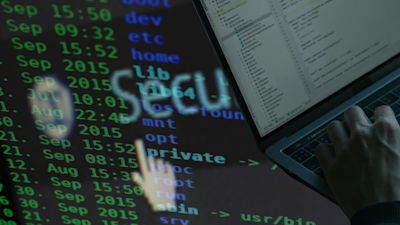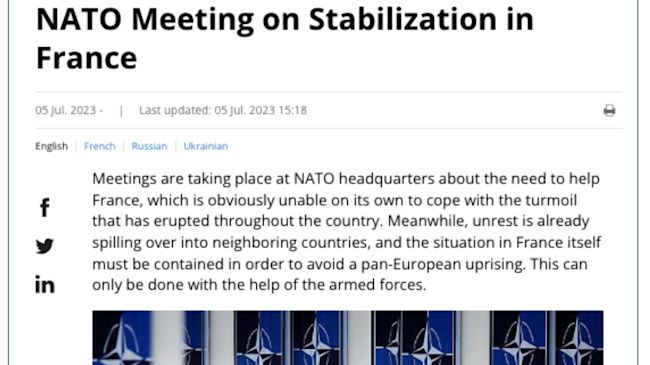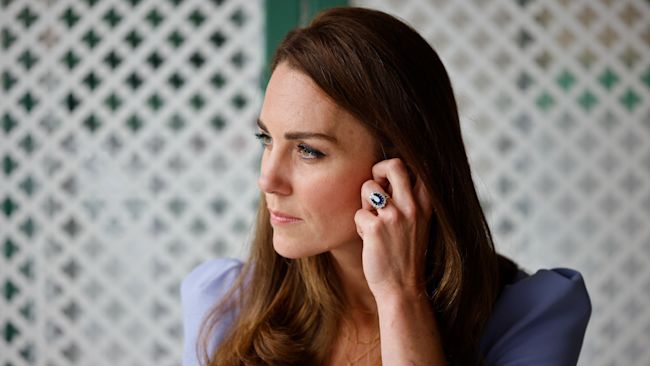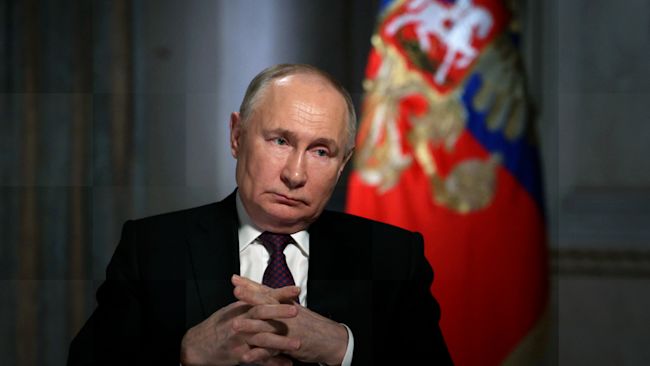Friday 19 April 2024
George Hancorn
Digital Video Producer

Russian "hacking" group Doppelgänger were first detected spreading misinformation in May 2022.
But despite many cyber-security experts now tracking what they're up to, it's thought they could have a significant influences on elections both at home and abroad.
They have been called the "largest" and "most aggressively persistent" group online.
Although it's not clear exactly where in Russia the group operates, we do know they are given a contract by the Kremlin to provide information manipulation services online.
"They came to our attention by creating fake media website," a security expert tells ITV News.
Martin Innes, a professor from the Security, Crime, and Intelligence Innovation Institute at Cardiff University, reveals how the group were first identified.
"The group began by mimicking well-known Western media brands online and would then copy some of their content but manipulate it."

Credit: EU MisinfoLab
The group have also faked government websites around the world and even pretended to be NATO.
More recently, though, the group were found to have been instrumental in the spread of misinformation around the Princess of Wales' cancer treatment video.
The original video, posted to X, has been viewed more than 106 million times.
And on TikTok there were more than 14 billion views on Kate-related videos in just a month.
It led to a large number of unfounded claims.
"We started to see these quite suspicious spikes in social media traffic around some elements of the story," Mr Innes says.
"And when we started looking into those in a bit more detail, we saw some patterns of behaviour that we recognised from things we'd done before and were then able to track them to Russia."
In a single day, 45 different accounts were found to be pushing and repurposing conspiracy theories related to the the Princess of Wales - and security experts say this was enough to link back to Doppelgänger
The group have also faked government websites around the world and even pretended to be NATO.
More recently, though, the group were found to have been instrumental in the spread of misinformation around the Princess of Wales' cancer treatment video.
The original video, posted to X, has been viewed more than 106 million times.
And on TikTok there were more than 14 billion views on Kate-related videos in just a month.
It led to a large number of unfounded claims.
"We started to see these quite suspicious spikes in social media traffic around some elements of the story," Mr Innes says.
"And when we started looking into those in a bit more detail, we saw some patterns of behaviour that we recognised from things we'd done before and were then able to track them to Russia."
In a single day, 45 different accounts were found to be pushing and repurposing conspiracy theories related to the the Princess of Wales - and security experts say this was enough to link back to Doppelgänger
.

Credit: PA
Mr Innes continues: "They weren't posting original content. What they were looking for was trending hashtags about the Princess of Wales and then they would post replies to comments made by other users."
Accounts would also post comments, often around an unrelated topic, like the war on Ukraine.
Usernames would also begin with the capitalised letter "A" or "B" - seen as another big giveaway.
Experts say the group are doing this to slowly erode trust in institutions and the media.
Social platforms have already issued warnings over the group.
Meta - who own Instagram and Facebook - said similar Russian and Chinese groups are already "well on their way" to influencing elections both here and in the US - by spreading misinformation.
In a 'threat report' issued by the company, the accounts they'd removed are believed to be linked to the organisation.
Mr Innes continues: "They weren't posting original content. What they were looking for was trending hashtags about the Princess of Wales and then they would post replies to comments made by other users."
Accounts would also post comments, often around an unrelated topic, like the war on Ukraine.
Usernames would also begin with the capitalised letter "A" or "B" - seen as another big giveaway.
Experts say the group are doing this to slowly erode trust in institutions and the media.
Social platforms have already issued warnings over the group.
Meta - who own Instagram and Facebook - said similar Russian and Chinese groups are already "well on their way" to influencing elections both here and in the US - by spreading misinformation.
In a 'threat report' issued by the company, the accounts they'd removed are believed to be linked to the organisation.

Credit: AP
Security experts have also warned about the impact groups like Doppelgänger could have over countries in the longer term.
"You get this kind of drip, drip, drip, corrosive effect that just builds up, where public trust in democracy declines, public trust in institutions declines", explains Mr Innes.
"Nobody knows what to believe when they read stuff online. That's probably the more worrying, destabilising effect that we need to focus our concerns upon."
Security experts have also warned about the impact groups like Doppelgänger could have over countries in the longer term.
"You get this kind of drip, drip, drip, corrosive effect that just builds up, where public trust in democracy declines, public trust in institutions declines", explains Mr Innes.
"Nobody knows what to believe when they read stuff online. That's probably the more worrying, destabilising effect that we need to focus our concerns upon."
No comments:
Post a Comment